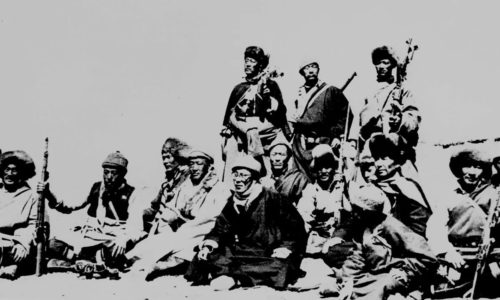Tibet’s most popular song is by a hip-hop duo whose name means ‘youthism’

Tibet is large, it contains multitudes, and so does Tibetan music. Even if we just consider the music of Tibet today, we find traditional expressions in Tibetan Opera, the “strumming and singing” (rdung len) of Tibetan nomadic culture, and the countless pop songs of love, faith, and Tibetan identity. Each of these genres has produced popular stars who have provided descriptions of and prescriptions for how to be Tibetan in this modern world. In recent years, however, no single song has been more important for Tibetan music than ANU’s “Fly” (“Phur”), released in May 2017.
ANU is a pair of young men from Nangchen County in Yushu Prefecture at the southern tip of Qinghai Province. Payag (巴雅 Bāyǎ) and Gönpa (宫巴 Gōngbā) moved to Beijing after studying art and music in western China and released their first EP, ANU, in 2016. ANU is an abbreviation for Anu Ringluk, which literally means “Youthism.” In the modern world of Tibet, already filled with established -isms such as Buddhism, socialism, and capitalism, ANU provides a fresh sound for a new generation.
Although many of their hits contain elements of folk, pop, and electronic dance music, ANU’s general message and style best fit into the world of Tibetan hip-hop. “It’s All a Game” (aka “Joke,” December 2016) and “1376” (January 2018) best represent their rapping skills, wordplay, and social criticism. Both “It’s All a Game” and “1376” warn of quotidian dangers and illusions all around us:
Livelihood … it’s a game. Spirit … it’s a game. Life … it’s a game.
Dreams … Hope … Affection … Tomorrow … Yesterday … Era … Everything … Nothing … All thought … All memory … All speech … All touch … All understanding … All perception … All food … All drink … It’s all a game.
Like Allen Ginsberg reading the Heart Sutra (“no form, no sensation, no recognition, no conceptualization, no consciousness; no eye, no ear, no nose, no tongue, no body, no mind; no color, no sound, no smell, no taste, no touch, no object of touch …”), here the ANU duo challenges our usual vision of the world. They do not leave us in the vacuous space of emptiness, however. As true players of the game, in “Fly,” ANU provides us with an injunction to find a new way of being.
Shackled by the chains of fate (karma)? Fly. Seeking to transcend the ocean of cyclic existence (samsara)? Fly. Looking for a realm of bliss (nirvana)? Fly. How, precisely, should one fly?
I suppose a detailed answer to that question is left for each listener to find based on the context of his or her own life, but ANU still provides the initial vision that such flight is possible. And, beyond this imperative to fly, let’s be honest — it’s a really catchy song:
“Fly” Yushu Video:
“Fly” Fan Covers:
As these videos attest, “Fly” has already captured the hearts of ANU’s fans in their hometown of Yushu as well as the rest of China. Last year they won an “innovation award” at the Tibetan, Qiang, and Yi Original Music Award Show, and this year they entered the Chinese national stage by competing on the popular TV show Singer 2019. Where will “Fly” take them next?
The power of ANU lies in their creative re-imagination of Tibet in the modern world. They allude to Buddhist concepts and traditional Tibetan proverbs while still appealing to hip-hop fans and general audiences. From the Tibetan nomads and farmers out on the plateau to the professionals of China’s megacities and millennials around the world, ANU is a new voice for Tibet. Their music can be streamed on Spotify and, like all successful hip-hop stars, they have created a line of merchandise called SARDUBA (literally “Innovation”), which is also the title of their most recent hit. May these youths continue to innovate — in song and in style — and, above all, may they continue to fly.





